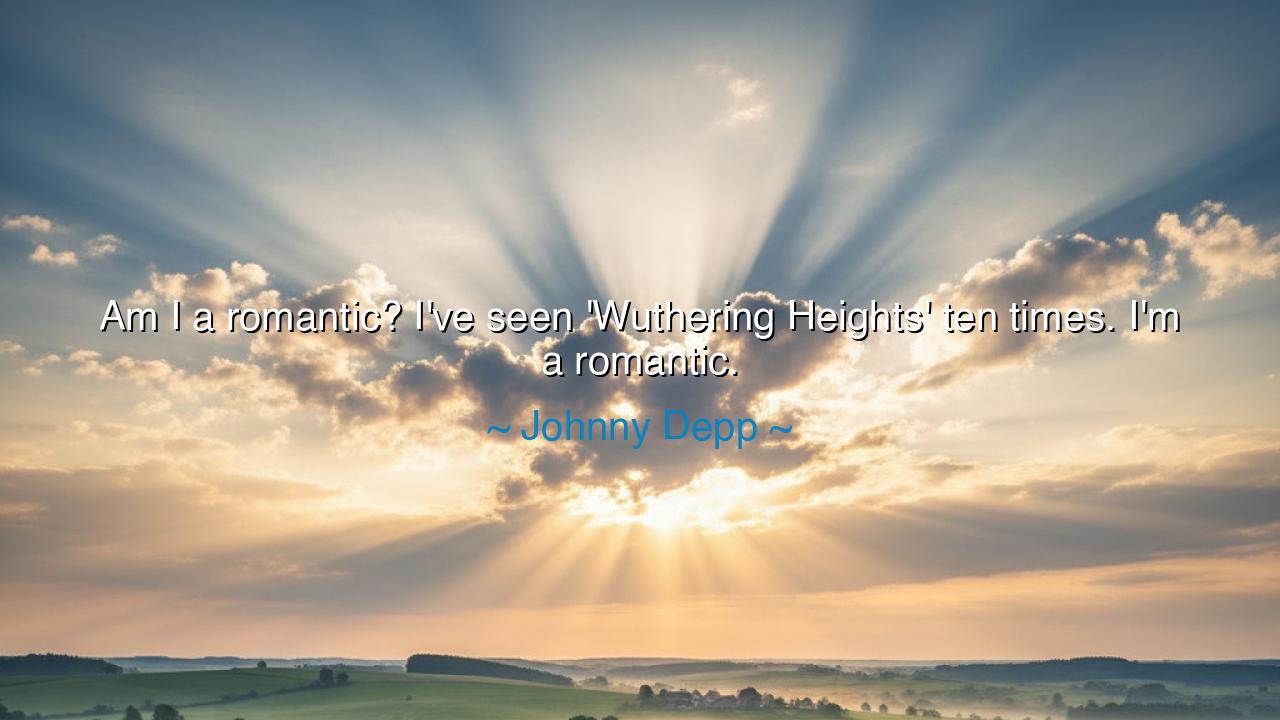
Am I a romantic? I've seen 'Wuthering Heights' ten times. I'm a






The actor Johnny Depp, with a touch of candor and a spark of self-revelation, once said: “Am I a romantic? I’ve seen ‘Wuthering Heights’ ten times. I’m a romantic.” At first glance, his words may sound playful, even casual. Yet beneath them lies a profound truth: that the heart declares itself not through theories or titles, but through the passions it returns to again and again. To watch “Wuthering Heights” ten times is not merely to enjoy a tale, but to be enthralled by the storm of love and tragedy that Emily Brontë painted—love that defies reason, storms that mirror the human heart, devotion that refuses to die even in the face of death.
To be a romantic, as Depp confesses, is not to wear a label lightly, but to hunger for stories where passion burns hotter than comfort, where the soul is tested against the winds of longing and despair. Brontë’s tale of Heathcliff and Catherine is not a gentle love story—it is a tempest, a fierce cry against the indifference of the world. That Depp would return to it again and again reveals a truth the ancients would have recognized: that the romantic spirit is drawn to intensity, to the eternal struggle between love and fate.
In this way, his quote is an echo of a timeless current. The Greeks told of Orpheus and Eurydice, a love that dared descend into the underworld itself. The Romans told of Aeneas and Dido, where passion battled with destiny and empire. And in the English moors of Brontë’s imagination, Catherine declares to Heathcliff, “I am Heathcliff,” merging identity itself into the flame of love. To be a romantic is to be captivated by these tales, not because they promise ease, but because they reveal the depth to which the human heart can go.
History, too, gives us examples of men and women who lived with such passion. Think of Napoleon and Josephine: though ambition ruled his life, it was his letters to her, filled with fire and longing, that revealed the true storm of his soul. Though their marriage faltered, his words endure as testaments of his romantic spirit. Or recall Abelard and Heloise, whose forbidden love gave rise to letters that still burn with intensity centuries later. These figures, like Brontë’s characters, remind us that the romantic heart is both blessed and burdened—it knows ecstasy, but it also risks ruin.
Depp’s words, then, are not only a personal confession but a mirror for all of us. They teach us that being a romantic is not about perfection in love, but about reverence for its power. It is about the willingness to be moved, again and again, by stories, by songs, by faces, by moments. To return to “Wuthering Heights” ten times is to admit that the heart cannot resist its own education—that it longs to be reminded, over and over, that love can be as wild as the wind and as eternal as the stars.
The lesson for us is this: do not be ashamed if your heart is stirred deeply, if you are drawn to stories of fierce passion and enduring devotion. Do not mistake romance for weakness. It is strength of another kind—the strength to remain tender in a world that grows cold, the courage to still believe in the power of connection, even after disappointment. To be a romantic is to keep alive the fire that cynicism cannot quench.
Practically, this means feeding your spirit with the stories and acts that awaken love. Read the great novels, revisit the great films, cherish the poems that stir your soul. And beyond this, enact romance in your daily life: write a letter, light a candle, offer a kindness unexpected. Return, like Depp to his film, to the places that remind you what it means to feel deeply. For in doing so, you will not only know what it means to be a romantic—you will live it, and pass that flame to those who walk after you.






AAdministratorAdministrator
Welcome, honored guests. Please leave a comment, we will respond soon